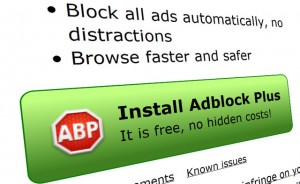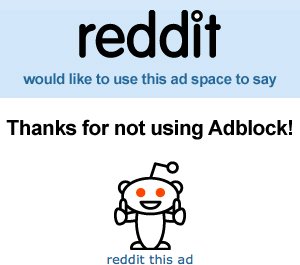Helping keep the information on the internet ‘free’ means doing your bit. Here are 5 reasons why ad blocking has grim consequences for you.
Disclaimer: We feel that blocking ads is not a long term internet-friendly solution and discourages publishers to create freely accessible content. However, we do realize how obtrusive and UX unfriendly some ad formats and networks are. Some initiatives like Acceptable Ads might be the right solution.
Online advertising uses ingenious technologies to find its way into our digital lives. A common belief is that advertising is ever-intrusive with, occasionally, overly aggressive intentions. How many times have you been startled by a pop-up ad or a video ad automatically playing out of the blue?
It’s such you’ve-gone-too-far advertising techniques that leave people no choice but to use ad-blocking software, plugins and devices like AdTrap for an ad-free Internet.
When we think of the benefits of having an ad-free Internet, seldom do we stop to ponder on the ramifications it has on content access and content quality. As it turns out, while ad blocking may have short-term benefits for the Internet user, the consequences for both consumer and content provider are numerous and interdependent.
Rethinking Online Advertising

Quality online content comes with a cost. Authors, journalists, researchers, bloggers dedicate time and intellectual effort to provide you with news, insightful ideas and knowledge. The content which you can easily access online, costs the publisher money.
When you turn on ad blocking you minimize the content publisher’s revenue. While ad blocking does have an indirect effect on publishers earning through cost per click based ads, many large publishers use ad-impressions (CPM) to earn from advertising.
So, each time an ad is displayed it’s counted as an ad-impression, irrespective of whether the user clicks on it. These ad-impressions translate into money which is used by the content publisher to pay authors, journalists, researchers, staff and finally itself if presumably they have any profits left.
What’s in it for me?
In some peculiar, paradoxical way, advertising benefits you. When you see beyond the momentary nuisance an ad might cause you, you can recognize the purpose it serves which is to offer you free access to information and news. Online advertising ensures the content provider earns back the money spent for providing that content in the first place.
Think of your favorite website, the one you visit before even checking your email (which says a lot), do you ad-block it? In essence, ad blocking is a refusal to acknowledge a website’s usefulness and purpose. It shows contempt towards those that make possible for you to learn about the latest developments in cloud technology and how scientists found that investing in ageing delay is more lucrative than investing in heart disease research.
You tip a bad service at a restaurant, why refuse to be exposed to advertising if it’s a way to give back to your favorite website?
So, why is blocking ads hurting the internet more than you think?
- Free access NO MORE
Advertising is a significant (and in many cases – only) source of revenue for publications and other online information websites. Bloggers and other professionals use advertising to make up for their time spent creating the content you read. With less ad revenue, big and smaller content providers are financially damaged. The New York Times, Boston Globe and Britain’s The Times use different paid digital content models in an effort to improve revenue and counteract losses, which ad blocking causes.
While paid digital content models seem like a drastic initiative, we should consider how efficient ad blocking has become. AdTrap is a configuration device that filters your Internet connection, providing you an ad-free Internet. It effectively intercepts ads so you can enjoy videos, content and movies without any ads to distract you. While this might sound like an Internet experience nirvana, its ramifications are beyond count.
Ad blocking is urging publications and media giants to experiment with different revenue models as they realize online advertising is no longer a viable option mainly due to the proliferation and enhancement of ad blocking technologies. Using pay walls is not exactly a million-dollar idea, in fact many times it have had the opposite effect, with subscriptions being very poor and online visitors heading to alternative free newspapers for their daily news fix.
While there were some failed attempts of introducing pay walls for online news content, the rationale is nonetheless justifiable. People pay for print copies of their dailies, why shouldn’t they pay a token for accessing online content by the same publication. What makes online copy less valuable than print copy that it should be free?
As ad blocking increases, companies will come up with unpleasant for the consumer strategies to counteract their advertising revenue losses. The lines between content and advertisements will become more blurred. Native ads, which is repackaging of advertorials, is being adopted.
By blocking ads, technically we are not killing the root cause, we are just stopping one channel (display ads) and pushing publishers to merge them in the content. - Quality GONE
While some companies use paid subscription models to increase revenue, others find ways to minimize content creation costs. This often means that online content will become less frequent and/or of a lesser quality.
Outsourcing content creation is an approach taken by many online media and publications who wish to decrease content creation costs by hiring low-paying professionals. As it’s often the case, such outsourcing endeavors yield poor quality content. Expertise does come with a cost.
- Incomplete information
If websites and newspapers offer their content through subscriptions, the whole idea of ‘free access to information’ crumbles. You can have as many subscriptions, inevitably important developments or news won’t reach you.
The Internet is not going to be a fee-based service any time soon, but we’ll surely see publications getting more aggressive in their attempts to counteract their ad revenue losses. If online advertising no longer serves them, other money-making models will be discovered. - Advertising isn’t that powerful
Advertising is profit-driven, no one ever claimed otherwise. Consumer behavior is affected by advertising, but even if we’d argue advertising influences consumer decision-making, 21st century consumers are savvy. They will research a brand thoroughly before deciding to invest in it. They will see beyond ad claims, search for impartial reviews, see what friends or people who’ve use it say, consider alternatives, and weigh the pros and cons.
- A matter of intrusiveness
Mobile advertising can be very intrusive and turn consumers away. A research showed that consumers were displeased when they were part of a mobile advertising campaign loop they didn’t consent to. Online advertising is not as pushy. Considering the intrusiveness of TV, cinema, postal and mobile advertising, online ads seem rather mellow.
Conclusion (doing your bit)
Consider exposure to advertising as a way to indirectly and rather painlessly, contribute financially to a publication’s or website’s sustainability. Deciding to go adblock-free is a pledge for keeping the Internet free.
It’s not a viable option to ad block everything because ultimately it benefits neither the consumer nor the content provider. Besides, there’s always a choice. You can choose less aggressive ad-based websites and blogs to get your news through.
For a commercially sustainable Internet, advertising is essential. Publishers will adopt new models for revenue, which will most likely mean less and low-quality content will be available for free. The rest will be on a pay-for basis.
Ad blocking is a wake-up call for advertising agencies and the media who use them, it’s telling them that consumers are becoming more discerning and demanding, but this could backfire as big news media and publications adopt more invasive advertising approaches including sponsored articles, backlinks and so on. Did it stop music and film piracy when Napster was shutdown? It’s a cat and mouse race.
Ultimately, it’s not about feeling guilty for ad-blocking your favorite website, it’s about realizing how your actions are to your disadvantage in the long-run.
Let me end this by saying that I too hate obtrusive, privacy invading, auto-playing videos, popups and all those annoying ads and ad formats. Let me also tell you that a lot of publishers use them and don’t care about UI/UX.
However, there are good publishers too which don’t use such formats and for whom user experience is still the most important objective.
So the question is that by blocking ads on all websites, is it fair to punish all the publishers for the mistakes of some?
FAQs
Your computer’s performance will not be affected by AdBlock. It’s a JavaScript extension that extends the functionality of the browser it’s installed in. The browser can’t affect anything outside of it.
Ad blockers and their users make it harder for small creators to earn money for original content on the Web. Ad blockers and their users reduce the business case for creating unique content on the Web.
Ad blockers can also interfere with a web page’s scripts, in addition to blocking ads. Your browsing experience will be negatively affected if this happens, as it will corrupt some of its important components and affect its functionality.
Ankit is a co-founder @ AdPushup (a tool which helps online publishers optimize ad revenues) and loves online marketing & growth hacking.







